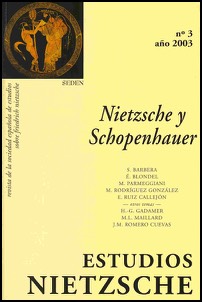El concepto de ilusión en Schopenhauer y Nietzsche
DOI:
https://doi.org/10.24310/EstudiosNIETen.vi3.9109Abstract
El concepto de ilusión (Schein, Illusion) ocupa un lugar central en las filosofías de Nietzsche y Schopenhauer. Nietzsche tomó de Schopenhauer esta problemática transformándola radicalmente a través de su perspectivismo hermenéutico. A pesar de ello, mantuvo en el concepto de ilusión el esquema formal básico, que tanto él como Schopenhauer extrajeron de Kant y su dialéctica trascendental. El descubrimiento de esta conexión obliga a reinterpretar una parte importante de los filosofemas schopenhauerianos y nietzscheanos, para depurarlos de numerosos malentendidos.
Downloads
Metrics
References
Clark, M., Nietzsche on truth and philosophy, New York Univ. Press, New York, 1990.
Diéguez Lucena, A., Realismo científico. Una introducción al debate actual en la filosofía de la ciencia, Universidad de Málaga, Málaga, 1998.
Figl, J., Interpretation als philosophisches Prinzip. Friedrich Nietzsches universale Theorie der Auslegung im späten Nachla?, W. de Gruyter, Berlin, 1982.
Kant, I., Crítica de la razón pura, ed. P. Ribas, Alfaguara, Madrid, 1988, «Dialéctica trascendental», Introducción I: «La ilusión trascendental».
Magge, B., Schopenhauer, Cátedra, Madrid, 1991.
Malter, R., Der eine Gedanke: Hinführung zur Philosophie Arthur Schopenhauers, Wissenschaftliche Buchgesellschaft, Darmstadt, 1988.
Nietzsche, F., Correspondencia I-VI. (CO). Director ed. Luis E. de Santiago Guervós. Madrid : Trotta, 2005- 2012.
Nietzsche, F., Fragmentos Póstumos I-IV (FP). Director ed. Diego Sánchez Meca. Madrid: Tecnos, 2006-2010.
Nietzsche, F., Obras Completas, I-IV (OC ). Director ed. Diego Sánchez Meca. Madrid: Tecnos, 2011-2016.
Parmeggiani, M., Nietzsche: Crítica y proyecto desde el nihilismo, Ágora, Málaga, 2002,
Parmeggiani, M., Perspectivismo y subjetividad en Nietzsche, Analecta Malacitana, Málaga, 2002.
Rábade Obradó, A. I., Conciencia y dolor. Schopenhauer y la crisis de la Modernidad, Trotta, Madrid, 1995.
Schopenhauer, A., Die Welt als Wille und Vorstellung en Sämtliche Werke, ed. A. Hübscher, Brockhaus, Wiesbaden, 1972.
Downloads
Published
How to Cite
Issue
Section
License
As of issue 21 (2021) this journal is published only in open access (diamond route).
From that number 21, like the previous numbers published in NIETZSCHE STUDIES, they are subject to the Creative Commons Acknowledgment-NoComercia-ShareIgual 4.0 license, the full text of which can be consulted at <http://creativecommons.org/licenses/by-nc-sa/4.0 >
It is the responsibility of the authors to obtain the necessary permissions of the images that are subject to copyright.
This work is licensed under a Creative Commons Attribution-NonCommercial-ShareAlike 4.0 International License.
Copyright generates two different rights: moral rights and patrimonial rights that EJFB recognizes and respects. Moral rights are those relating to the recognition of the authorship. They are rights of a personal nature that are perpetual, inalienable, unseizable and imprescriptible as consequence of the indivisible union of the author and his/her work.
Patrimonial rights are those that can be derived from the reproduction, distribution, adaptation or communication of the work, among others.







11.png)
